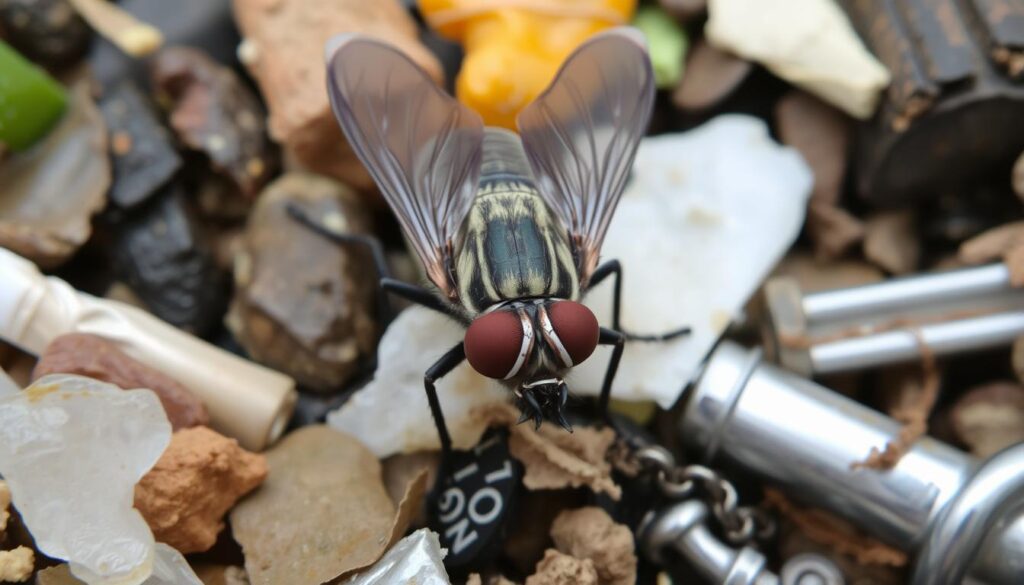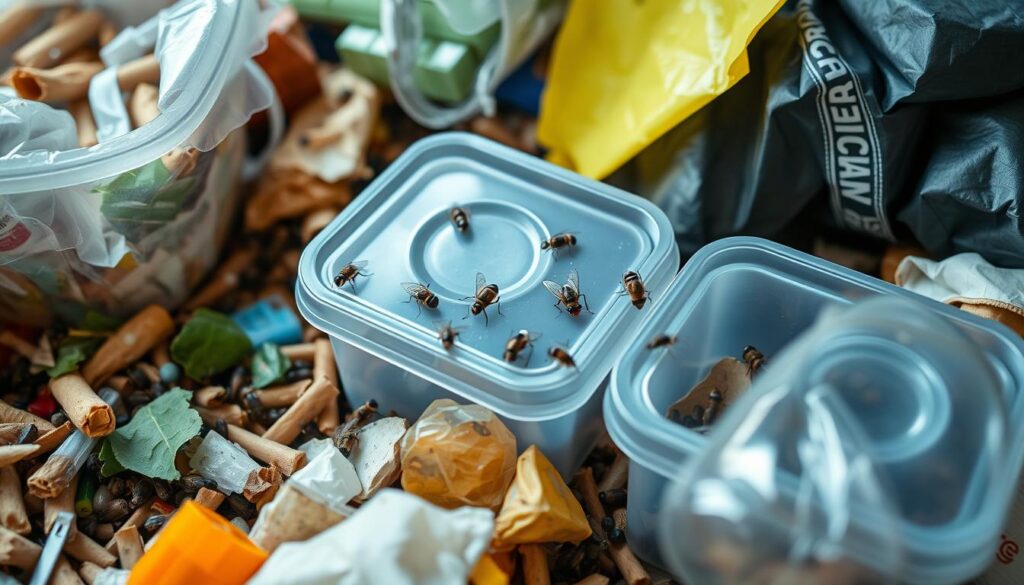Ever thought about how throwing away waste affects flies?
The right way to sort waste is key to keeping flies away. We’ll look into why sorting waste is important and how it helps fight flies.
By the way, if you’re looking for a professional bin cleaning service, you can check the areas we cover and book it here.
Key Takeaways
- Proper waste segregation helps prevent fly breeding grounds and reduces the spread of harmful germs.
- Regulators require waste sites to have a fly management plan to assess and address the risk of on-site fly infestations.
- Maintaining clean waste receptacles and effective waste removal are essential for eliminating fly problems.
- Communicating with waste removal contractors and implementing best waste management practices are crucial for pest control.
- Sustainable waste management practices, such as recycling and composting, can significantly reduce the environmental impact of waste disposal.
The Importance of Proper Waste Segregation
Good waste management keeps our environment and health safe. Segregating waste right helps a lot. It makes recycling better and follows the rules. This helps us all live in a cleaner world.
Regulatory Requirements for Waste Management
In the UK, rules say waste sites must have a fly plan. This plan stops flies from being a problem. California also has rules for keeping food clean and safe from flies.
Environmental and Health Impacts of Improper Waste Handling
Handling waste badly harms our air and water. It can make people sick and attract pests. Every year, we throw away a huge amount of waste. We need to manage it better.
| Waste Type | Examples | Proper Segregation |
|---|---|---|
| Hazardous Waste | Batteries, chemicals, electronic waste | Segregated and disposed of separately according to specific regulations |
| Construction and Demolition Waste | Concrete, wood, metals, plastics | Segregated for recycling or proper disposal |
| Vehicle and Oily Waste | End-of-life vehicles, tyres, air filters, car batteries | Segregated for recycling or proper disposal |
| Dry Mixed Recycling | Packaging materials, paper, plastic containers | Segregated for recycling |
| Food Waste | Leftovers, peels, spoiled food | Segregated for composting or anaerobic digestion |
| Textile Waste | Clothing, shoes, linens | Segregated for recycling or reuse |
Segregating waste well helps businesses recycle more. It keeps them in line with the rules. It also protects our planet and health.
Understanding Fly Biology and Behaviour
Flies are everywhere and can be harmful to our health. To fight fly problems, we need to know how they live and act. Let’s look at the important parts of fly biology for better fly control.
Common Fly Species and Their Preferred Breeding Grounds
The house fly is everywhere and loves dirty places. It lays up to 500 eggs in a few days. The best temperature for laying eggs is between 25 to 30°C.
Other flies like little house flies and black garbage flies like pet waste. Blow flies and flesh flies prefer dead animals and garbage.
Life Cycle and Feeding Habits of Flies
Fly larvae, or maggots, grow fast in warm places. They can grow up in just four to 13 days. Adult flies live 15 to 25 days, but can live longer if they have food and it’s warm.
House flies can spread diseases like Salmonella and E. coli. They can carry 3,683,000 bacteria in slum areas.

Knowing how flies live and breed helps us manage them better. This reduces health risks from their presence.
Proper waste segregation
Managing waste well is key to stop flies in your place. It’s important to sort waste into different groups. This makes it easier to handle and throw away.
Separating Waste Streams for Effective Management
First, find out the different waste streams in your area. These include food waste, recyclables, harmful stuff, and regular trash. Use bins with clear labels for each type. This helps everyone know where to put things.
In the UK, soon places with 10 or more workers will have to sort dry recyclables and food waste. Starting early shows you care about the planet.
Preventing Fly Infestations through Proper Waste Handling
- Drain food waste before throwing it away to stop flies.
- Use plastic bags in bins to stop spills and smells.
- Take out trash before it gets dark to stop flies.
- Keep places where trash is stored clean and dry.
- Fix any leaks in drains or garbage disposals fast.
Following these tips for waste handling makes your place less welcoming to flies. This stops them from breeding and keeps everyone safe.
| Waste Type | Proper Handling |
|---|---|
| Food Waste | Drain, bag, and remove regularly to deter flies |
| Recyclables | Sort, store, and transport to recycling facilities |
| Hazardous Waste | Contain, label, and dispose of through licensed handlers |
| General Rubbish | Bag and remove to appropriate disposal or collection points |
“Waste segregation can lead to improved recycling rates and help achieve zero landfill goals.”
Monitoring and Record Keeping for Fly Management
Good pest management starts with watching flies closely. This way, you can spot problems early and adjust your control plans. Using fly traps and checking breeding sites helps a lot.
It’s also key to keep records of what you do and what happens. This helps you see if your fly control is working. You can then make better choices for the future.
Keeping a log of fly numbers is very important. Fly speck cards show how many flies there are. If there are too many, you need to use special treatments.
Finding out how many flies you can tolerate is important. It helps you focus your efforts and see if they’re working. By keeping an eye on fly monitoring and record keeping, you can handle pest management better. This keeps your place safe from fly problems.

“Effective fly control programs should combine multiple control methods with diligent monitoring to minimise economic and health threats posed by flies.”
Habitat Modification and Sanitation Practices
Keeping your space clean is key to stopping flies. By tackling the main causes, you can stop flies from coming in. This helps keep you and your family safe.
Let’s look at some important steps. These can help get rid of flies and keep your area smelling fresh.
Eliminating Food Sources for Flies
Flies love food waste. So, it’s important to throw away organic stuff right away. Start by emptying bins of leftover food. Use plastic bags in all bins.
Make sure to take out bins with food waste before it gets dark. Flies are most active then.
Using closed, rodent-proof bins can also keep flies away. Clean your bins often to get rid of smells. Flies can breed in water used to clean bins, so check and clean these areas well.
Keeping Waste Receptacles Clean and Odour-Free
Clean bins are key to stopping flies. Use hot water, bleach, and washing up liquid to clean bins. Make sure all surfaces are clean and smell-free.
Fixing any bin or drain problems quickly is also important. These can attract flies.
By following these steps, you can reduce flies. This makes your space healthier and free from pests.
| Habitat Modification Practices | Sanitation Practices |
|---|---|
|
|
By following these steps, you can reduce flies. This makes your space healthier and free from pests.
“Proper waste management is not just a matter of convenience, but a crucial aspect of public health and environmental protection.”
The Role of Professional Pest Control Services
Some waste companies deal with flies on their own. But, getting help from pest control experts is often better. They have more experience and can make plans that really work for you.
Integrated Pest Management Strategies
Controlling flies means using smart, non-toxic ways first. Then, they might use insecticides if needed. Experts look at how you manage waste and find where flies breed. They then make a detailed plan to fix the problem.
- Conduct thorough inspections to pinpoint problem areas
- Implement effective sanitation and habitat modification techniques
- Utilise targeted, controlled application of insecticides when required
- Provide ongoing monitoring and record-keeping to track the effectiveness of control efforts
Choosing professional pest control means your fly plan will work well and last. It makes your place safer and cleaner.
“Partnering with pest control professionals can help you develop a tailored, integrated approach to managing flies and other pests, ensuring long-term success in maintaining a clean and healthy waste management system.”
Benefits of Proper Waste Segregation
Proper waste segregation has many benefits for businesses in the United Kingdom. It helps reduce fly problems and health risks. It also ensures regulatory compliance and saves money.
Reducing Fly Problems and Associated Health Risks
Fly infestations can be a big problem. They can contaminate food and spread diseases. Proper waste management stops flies from breeding.
This makes places cleaner and safer. It lowers the risk of fly-borne illnesses for everyone.
Compliance with Regulations and Avoiding Penalties
The United Kingdom has strict rules about waste and pests. The Hazardous Waste Regulations 2005 in England and Wales, and the Special Waste Regulations 1996 in Scotland are examples. By segregating waste well and keeping places clean, you follow these rules.
This helps you avoid expensive fines for not following the rules.
| Benefit | Percentage Impact |
|---|---|
| Reduced disposal costs | 25% |
| Increased recycling and resource recovery | 20% |
| Improved workplace safety and hygiene | 30% |
| Compliance with regulations | 35% |
By focusing on waste segregation benefits, fly problem reduction, health risk reduction, and regulatory compliance, you can make your business better. You protect your team and customers. You also help the environment.
“Effective waste segregation can lead to significant financial benefits and environmental impact reductions for healthcare providers.”
Conclusion
Effective waste management is key to reducing fly problems and keeping us healthy. By learning about flies and how to handle waste, businesses in the UK can make their places cleaner and safer. This also helps them follow rules and keep their good name.
We’ve talked about why sorting waste is important. We’ve also looked at the rules for managing waste and how it affects our health and the planet. We’ve even learned about flies and how to stop them from coming back.
To solve fly problems, we need to work together. Businesses, communities, and governments must join forces. They can make rules, teach people, and use new waste technologies. This way, we can all help make the UK a cleaner, greener place.
